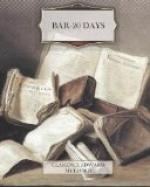The song stopped abruptly. “Shore,” replied Johnny. “We’re going to have trouble aplenty to-night. Glad daylight ain’t so very far off. That cussed li’l rake of a bummer got by me an’ into the herd. He’s shore raising Ned to-night, the li’l monkey: it’s getting serious, Red.”
“I’ll shoot that yearling at daylight, damn him!” retorted Red. “I should ‘a’ done it a week ago. He’s picked the worst time for his cussed devilment! You ride right in an’ get the boys, an’ get ’em out here quick. The whole herd’s on its toes waiting for the signal; an’ the wink of an eye’ll send ’em off. God only knows what’ll happen between now and daylight! If the wind should change an’ blow down from the north, they’ll be off as shore as shooting. One whiff of Bennett’s Creek is all that’s needed, Kid; an’—”
“Oh, pshaw!” interposed Johnny. “There ain’t no wind at all now. It’s been quiet for an hour.”
“Yes; an’ that’s one of the things that’s worrying me. It means a change, shore.”
“Not always; we’ll come out of this all right,” assured Johnny, but he spoke without his usual confidence. “There ain’t no use—” he paused as he felt the air stir, and he was conscious of Red’s heavy breathing. There was a peculiar hush in the air that he did not like, a closeness that sent his heart up in his throat, and as he was about to continue a sudden gust snapped his neck-kerchief out straight. He felt that refreshing coolness which so often precedes a storm and as he weighed it in his mind a low rumble of thunder rolled in the north and sent a chill down his back.
“Good God! Get the boys!” cried Red, wheeling. “It’s changed! An’ Pete an’ Billy out there in front of—there they go!” he shouted as a sudden tremor shook the earth and a roaring sound filled the air. He was instantly lost to ear and eye, swallowed by the oppressive darkness as he spurred and quirted into a great, choking cloud of dust which swept down from the north, unseen in the night. The deep thunder of hoofs and the faint and occasional flash of a six-shooter told him the direction, and he hurled his mount after the uproar with no thought of the death which lurked in every hole and rock and gully on the uneven and unseen plain beneath him. His mouth and nose were lined with dust, his throat choked with it, and he opened his burning eyes only at intervals, and then only to a slit, to catch a fleeting glance of—nothing. He realized vaguely that he was riding north, because the cattle would head for water, but that was all, save that he was animated by a desperate eagerness to gain the firing line, to join Pete and Billy, the two men who rode before that crazed mass of horns and hoofs and who were pleading and swearing and yelling in vain only a few feet ahead of annihilation—if they were still alive. A stumble, a moment’s indecision, and the avalanche would roll over them as if they were straws and trample them flat beneath the pounding hoofs, a modern Juggernaut. If he, or they, managed to escape with life, it would make a good tale for the bunk house some night; if they were killed it was in doing their duty—it was all in a day’s work.




